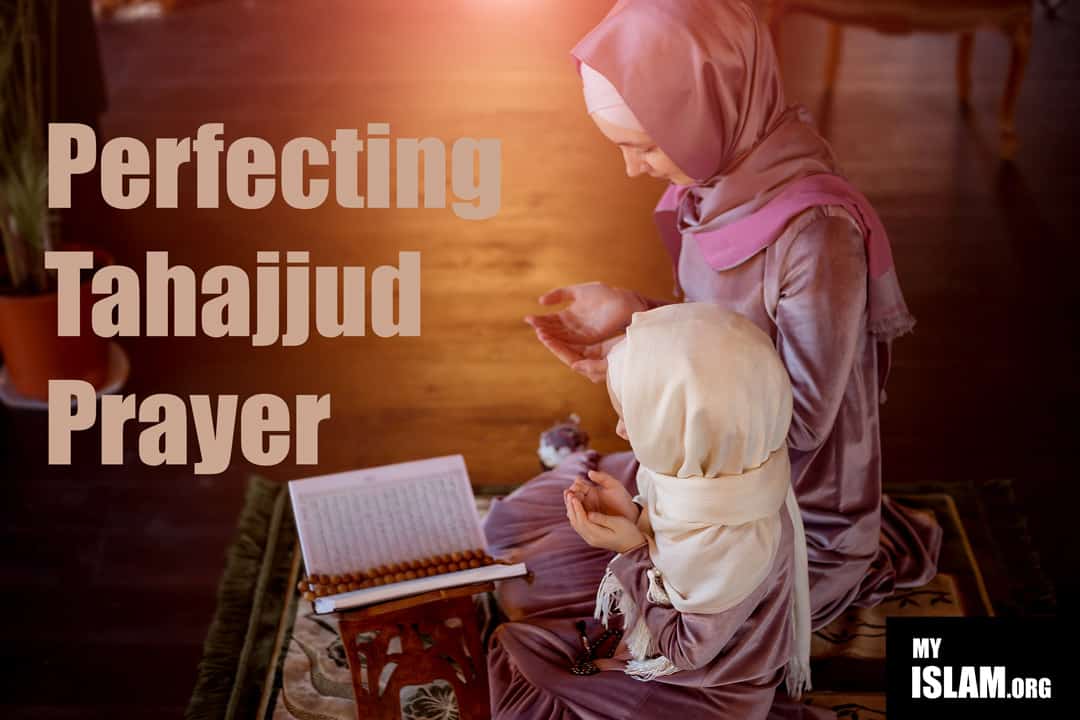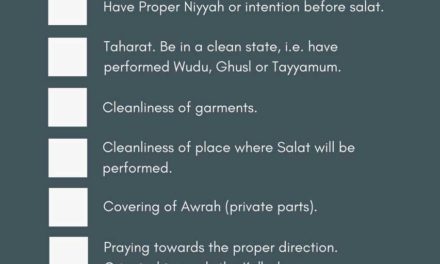Anything Salah that is offered after Isha prayer and before Fajr is classified as part of the night prayer. There are different kinds of night prayers in Islam as we have taraweeh, witr Salah, and Tahajjud salah. In this article we will learn how to perfect tahajjud and the rewards associated for the Muslim who prays it.

What is tahajjud?
The literal meaning of Tahajjud is giving up of sleep. This prayer is voluntary (nafl salah) meaning it is not an obligation, missing it will not be considered as a sin on the believer.
Benefits and Power of praying tahajjud salah
In the sahih hadith of Sunan Abu Dawud, Rasulullah (ﷺ) had mentioned the first action which a man shall be called into account on the day of resurrection will be his salah. If it is sound, he will attain salvation, if it is defective, he will surely be disappointed and among the losers. If anything is missing from the fardh salah, Allah will say, look if there are any Nafl salah (voluntary prayer) in the account of my servant. Whatever is lacking in his obligatory salah can be be made up by them. [1]
ALLAH IS LISTENING CLOSELY AT THIS TIME:
Allah the exalted has said, no slave of mine can seek nearness to me with anything more worthy than what I made obligatory unto him. My salve then continues to seek my nearness with extra Nafl salat until I start loving him. When I love him, I become his ears with which he hears, his eyes with which he sees, his hands with which he holds and his legs with which he walks and if he prays for something, I grant it to him, and if he seeks my protection, I give it to him. [2]
In Sahih Bukhari, during the time of tahajjud Allah is seeking out, is there anyone asking who wants to ask me for any of their needs for I am here to assist them and fulfill those needs of yours. [3]
Subhanallah.
Narrated by Abu Hurairah (RA): Allah’s Messenger (ﷺ) said: “The most excellent prayer after that which is obligatory is the (voluntary) late night prayer.” [4]
What time can tahajjud be prayed?
The time to offer the tahajjud prayer is anytime after midnight. This can be done in the early part of the night, middle of the night or in the third part of the night. The sunnah of the Prophet (ﷺ) according to Aisha, may Allah be pleased with her, reported that he used to offer the night prayer in the third portion right before sunrise. [5]
Tahajjud Prayer During Ramadan
The tahajjud prayer is one that can be prayed daily outside of Ramadan and is not contained for special occasions.
None of us are perfect, we have strict obligations like work which warps our schedules and fixes our sleeping cycles. The reality for many of us, unfortunately, is we are not entirely free to structure our day to practice our faith full time.
However, the beauty during the month of Ramadan is that we are going to be awake at the time of suhoor to fill our bellies. How many of us knew during the time time we are awake for sehri that our creator is calling out to us and saying, is there anyone seeking forgiveness so that I may forgive them? [3,6]
Can we get up 5 minutes or 10 minutes earlier before eating to read tahajjud. If we do not do this year around can we at least fulfil this salah for a month?
Quran Verses Regarding Tahajjud
Allah says in the Qur’an, “And the servants of the Most Merciful are those who walk upon the earth easily, and when the ignorant address them [harshly], they say [words of] peace, And those who spend [part of] the night to their Lord prostrating and standing [in prayer]” Surah Al Furqan Ayah 63-64
Surah Adh-Dhariyat “Indeed, the righteous will be among gardens and springs, Accepting what their Lord has given them. Indeed, they were before that doers of good. They used to sleep but little of the night, And in the hours before dawn they would ask forgiveness, And from their properties was [given] the right of the [needy] petitioner and the deprived.”
“And from [part of] the night, pray with it as additional [worship] for you; it is expected that your Lord will resurrect you to a praised station.” Surah Al-Isra ayah 79.
“Is one who is devoutly obedient during periods of the night, prostrating and standing [in prayer], fearing the Hereafter and hoping for the mercy of his Lord, [like one who does not]? Say, “Are those who know equal to those who do not know?” Only they will remember [who are] people of understanding.” Surah Zumar Ayah 9
How To Pray and General Regulations:
The steps to praying the tahajjud salah is the same as praying any other of the daily Fardh or sunnah prayers (read our guide on perfecting how to pray the Salah). Here are some general requirements you should consider:
- This prayer must be read after Isha and before Fajr. You should fall asleep and wake up, preferably in the third portion of the night to pray. [5]
- The Sunnah is to offer the Witr Salat after you pray the Tahajjud Salat. [7]
- There are no set number of rakats you must pray. It is recommended the Salah is offered in units of two rakats. So you may offer 2, 4, 6, 8, or even 10 rakats for tahajjud, it is encouraged that you pray as many as you’d wish.
- All other conditions for salah also apply to the tahajjud prayer such as doing wudu.
- Before going to sleep, it is recommended that one have the intention (niyyah) that he is going to wake up to perform the night prayer.
- It is sunnah to also wake up your spouse at night and to pray in congregation so together they remember Allah.
Final Thoughts:
Inshallah we can develop the habit to pray this nafl salah, especially during the month of Ramadan where the rewards are multiplied, gates to heaven are open, and when the effort required to pray this salah is much easier.
“Indeed, I am Allah. There is no deity except Me, so worship Me and establish prayer for My remembrance.” Surah Taha Ayah 14
May Allah subhanahu wa ta’ala protect us all.
References:
[1] the Prophet (ﷺ): The first thing about which the people will be called to account out of their actions on the Day of Judgment is prayer. Our Lord, the Exalted, will say to the angels – though He knows better: Look into the prayer of My servant and see whether he has offered it perfectly or imperfectly. If it is perfect, that will be recorded perfect. If it is defective, He will say: See there are some optional prayers offered by My servant. If there are optional prayer to his credit, He will say: Compensate the obligatory prayer by the optional prayer for My servant. Then all the actions will be considered similarly. Sunan Abu Dawud Hadith 864 classified as Sahih (Al-Albani).
[2] Messenger of Allah (ﷺ) said, “Allah the Exalted has said: ‘I will declare war against him who shows hostility to a pious worshipper of Mine. And the most beloved thing with which My slave comes nearer to Me is what I have enjoined upon him; and My slave keeps on coming closer to Me through performing Nawafil (prayer or doing extra deeds besides what is obligatory) till I love him. When I love him I become his hearing with which he hears, his seeing with which he sees, his hand with which he strikes, and his leg with which he walks; and if he asks (something) from Me, I give him, and if he asks My Protection (refuge), I protect him”. Sahih al-Bukhari 6502 and Riyad as-Salihin Arabic/English book reference: Book 1, Hadith 95
[3] Allah’s Messenger (ﷺ) said, “Our Lord, the Blessed, the Superior, comes every night down on the nearest Heaven to us when the last third of the night remains, saying: “Is there anyone to invoke Me, so that I may respond to invocation? Is there anyone to ask Me, so that I may grant him his request? Is there anyone seeking My forgiveness, so that I may forgive him?” Sahih Bukhari Hadith 1145
[4] Bulugh al-Maram Arabic reference: Book 2, Hadith 369
[5] Narrated Masruq: I asked `Aisha “What deed was the most beloved to the Prophet?” She said, “The regular constant one.” I said, “At what time did he use to get up at night (for the Tahajjud night prayer)?’ She said, “He used to get up on hearing (the crowing of) the cock (the last third of the night). Sahih al-Bukhari 6461
[6] It was narrated from Abu Hurairah that: The Messenger of Allah (ﷺ) said: “Whoever prays Qiyam during Ramadan out of faith and in the hope of reward, he will be forgiven his previous sins.” Grade: Sahih (Darussalam) Sunan an-Nasa’i 1602
[7] Aishah (May Allah be pleased with her) reported: The Prophet (ﷺ) used to perform his voluntary prayer at night (i.e., Tahajjud prayer) while she was sleeping in front of him; and when the Witr prayer was yet to be observed, he would awaken her to perform her Witr prayer. [Muslim] Riyad As Salihin Arabic Book 9, Hadith 1136
[8] Narrated Masruq: I asked Aisha about the night prayer of Allah’s Messenger (ﷺ) and she said, “It was seven, nine or eleven rak`at besides the two rak`at of the Fajr prayer (i.e. Sunna). Sahih al-Bukhari 1139.
Similar hadith in Sahih Al-Bukhari number 1140. Narrated Aisha: The Prophet (p.b.u.h) used to offer thirteen rakat of the night prayer and that included the witr and two rak`at (Sunna) of the Fajr prayer.







Is it okay if I will use short surah ? Shukran.
There are no specific surah of the Qur’an which is prohibited to be recited in the night prayers. You can recite whatever you are able from the Qur’an.
Mashallah
May Allah swt reward You for your work.
I am convert sister and Alhamdullilah this has helped.
Need to post more advert with this site so more people can read.
Definitely revisiting time and time again for knowledge.
Thank You. It really does help people.
May almighty Allah continued blessed a
very educative.
Assalamualaikum warahmatullahi wabarakatuh.
I call Iqamah before I start to perform tahajjud. Or should I do Azan and Iqamah or i should just start directly?